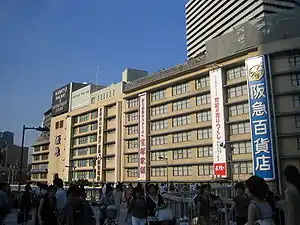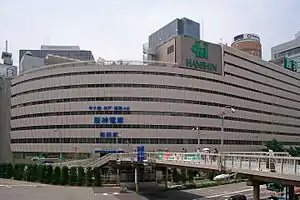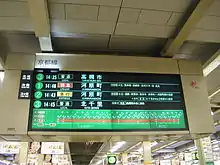Umeda Station 梅田駅 | |
|---|---|
 | |
| General information | |
| Location | Kita Ward, Osaka City, Osaka Prefecture Japan |
| Operated by | |
| Connections | |
Umeda Station (梅田駅, Umeda-eki) is a railway station in Kita-ku in the northern commercial center of Osaka, Japan. It is the busiest station in western Japan, serving 2,343,727 passengers daily in 2005.
Umeda Station is served by the following railways:
- Hankyu Railway (Kōbe Line, Kyōto Line, Takarazuka Line) - Osaka-umeda Station
- Hanshin Electric Railway (Main Line) - Osaka Umeda Station
- Osaka Metro (Midōsuji Line, Station number: M16)
The freight terminal of Japan Freight Railway Company (JR Freight) (Umeda Freight Branch of Tōkaidō Main Line), closed in 2013, was also called Umeda.
The nearby stations Ōsaka (JR West), Kitashinchi (JR West Tōzai Line), Nishi-Umeda (Osaka Subway Yotsubashi Line, Y11) and Higashi-Umeda (Osaka Subway Tanimachi Line, T20) are within walking distance and connected by a large complex of underground malls.
Hanshin Railway
Osaka-Umeda Station 大阪梅田駅 | |
|---|---|
| Hanshin Railway station | |
 | |
| General information | |
| Location | Umeda Sanchōme, Kita-ku, Osaka, Osaka Prefecture Japan |
| Coordinates | 34°42′3.49″N 135°29′47.2″E / 34.7009694°N 135.496444°E |
| Operated by | Hanshin Electric Railway |
| Line(s) | Hanshin Main Line |
| Other information | |
| Station code | HS 01 |
| History | |
| Opened | 1906 |
| Location | |
 Osaka-Umeda Station Location within Japan | |
The underground Umeda terminal of Hanshin Electric Railway (officially Osaka-Umeda Station, but commonly called Hanshin Osaka-Umeda Station) is located south of Ōsaka Station, next to underground of Hanshin Department Store. The Hanshin station first opened on December 21, 1906 as a ground level station and moved to the present underground location on March 21, 1939.
Layout
There are five bay platforms and four tracks on the second basement. There are east ticket gates on the second basement and center ticket gates and west ticket gates on the first basement.
| 1 | (Not used during non-rush hour) ■■limited express trains (for Kobe and Himeji) |
|---|---|
| 2 | ■■limited express trains (for Kobe and Himeji) |
| 3 | ■express trains ■morning express trains ■a limited express train departing for Himeji at 6:25 (weekdays) |
| 4 | ■local trains |
Adjacent stations of Hanshin Osaka-Umeda
| « | Service | » | ||
|---|---|---|---|---|
| Main Line (HS 01) | ||||
| Terminus | Local (普通, every day) | Fukushima (HS 02) | ||
| Terminus | Morning Express(区間急行, on weekdays) | Fukushima (HS 02) | ||
| Terminus | Express (急行, every day) | Noda (HS 03) | ||
| Terminus | Limited Express (直通特急, 特急, every day) | Amagasaki (HS 09) | ||
| Terminus | Morning Limited Express terminating at Umeda (区間特急, on weekdays) | Noda (HS 03) | ||
Hankyu Railway
Osaka-umeda Station 大阪梅田駅 | |
|---|---|
| Hankyu Railway station | |
 Platforms of Hankyu Umeda Station | |
| General information | |
| Location | 1-2, Shibata Itchōme, Kita-ku, Osaka, Osaka Prefecture Japan |
| Coordinates | 34°42′19.85″N 135°29′53.92″E / 34.7055139°N 135.4983111°E |
| Operated by | Hankyu Corporation |
| Line(s) | |
| Other information | |
| Station code | HK-01 |
| History | |
| Opened | 1910 |
The Umeda terminal of Hankyu Railway (officially Osaka-umeda Station, but commonly called Hankyu Osaka-umeda Station) is located northeast of Ōsaka Station.
The station first opened on March 10, 1910, as a ground-level station. The original location of the station was southeast of Ōsaka Station and the Hankyu (then Minoo-Arima Electric Tramway) tracks crossed the Tōkaidō Main Line by an overpass. The station was elevated on July 5, 1926.

When Osaka Station was elevated in 1934, Hankyu's elevated tracks were forced to be removed and new Umeda Station was built to handle new ground-level tracks. The switching of tracks were carried out on June 1, 1934. This station facility was used until November 28, 1971, when the move of station to the present location was completed. This move was because of a sharp increase of transit, which forced Hankyu to operate 8-car trains. The existence of JNR tracks on the northern end of the 1934 station prevented the expansion of the station so that the station could not handle long trains.
After the opening of the current huge elevated station, spaces around and beneath the station, as well as the site of former station, were extensively redeveloped. One of the symbols of the commercial complex surrounding the station is the BIG MAN video screen above the Kinokuniya bookshop, common and necessary places to meet in this bustling railway station.
The Hankyu Department Store, built next to the station in 1929, was a pioneer of the successful business model of department stores run by urban railway companies in Japan. The store is still in business at the original location even after the move of the station (as of 2007, the reconstruction of the store building is in progress).
Station numbering was introduced to all Hankyu stations on 21 December 2013 with this station being designated as station number HK-01.[1]
Layout
There are ten bay platforms serving nine tracks on the third floor. There are south ticket gates on the third floor and center ticket gates and on Chayamachi ticket gates on the second floor.
| 1 | ■limited express trains ■local trains |
|---|---|
| 2 | ■local trains (non rush-hour) ■commuter limited express trains (in the morning and the evening on weekdays) ■rapid express trains (in the morning and the evening) |
| 3 | ■semi-express trains ■rapid services (in the evening on weekdays) ■local trains (partly in the morning on weekdays) ■rapid limited express A trains "Kyo-Train" (on the weekend and holidays) ■rapid limited express trains "Kyo-Train Garaku" (on the weekend and holidays) |
| 4 | ■express trains (every day) ■local trains (weekday morning rush hours only) ■limited express trains for Nissei-Chuo (weekday evening rush hours only) |
|---|---|
| 5 | ■local trains (every day) ■express trains (weekday rush hours only) |
| 6 | ■local trains (weekday rush hours only) |
| 7 | ■local trains |
|---|---|
| 8 | ■limited express trains (non-rush hour) ■express trains (in the morning on weekdays) ■commuter express trains (from the evening until night on weekdays) ■local trains (every early morning and every night) |
| 9 | ■limited express trains ■commuter limited express trains ■rapid express trains ■express trains ■local trains (every early morning and every night) |
Adjacent stations of Hankyu Osaka-umeda
| « | Service | » | ||
|---|---|---|---|---|
| Kobe Main Line | ||||
| Terminus | Local | Nakatsu (HK-02) | ||
| Terminus | Semi-Express (terminating only) | Jūsō (HK-03) | ||
| Terminus | Express Rapid Express Commuter Express |
Jūsō (HK-03) | ||
| Terminus | Limited Express Commuter Limited Express |
Jūsō (HK-03) | ||
| Takarazuka Main Line | ||||
| Terminus | Local | Nakatsu (HK-02) | ||
| Terminus | Semi-Express (terminating only) | Nakatsu (HK-02) | ||
| Terminus | Express | Jūsō (HK-03) | ||
| Terminus | Commuter Limited Express (terminating only) | Jūsō (HK-03) | ||
| Terminus | Limited (Nissei) Express | Jūsō (HK-03) | ||
| Kyoto Main Line | ||||
| Terminus | Local | Jūsō (HK-03) | ||
| Terminus | Semi-Express | Jūsō (HK-03) | ||
| Terminus | Rapid Service | Jūsō (HK-03) | ||
| Terminus | Rapid Express | Jūsō (HK-03) | ||
| Terminus | Limited Express Commuter Limited Express Rapid Limited Express "Kyo-Train Garaku", "Sagano" |
Jūsō (HK-03) | ||
| Terminus | Rapid Limited Express A "Kyo-Train" | Awaji (HK-63) | ||
Osaka Metro
M 16 Umeda Station 梅田駅 | |||||||||||
|---|---|---|---|---|---|---|---|---|---|---|---|
 Station mezzanine | |||||||||||
| General information | |||||||||||
| Location | 8-6, Kakudachō, Kita-ku, Osaka, Osaka Prefecture Japan | ||||||||||
| Coordinates | 34°42′10.22″N 135°29′51.89″E / 34.7028389°N 135.4977472°E | ||||||||||
| Operated by | |||||||||||
| Line(s) | |||||||||||
| Platforms | 1 island platform | ||||||||||
| Tracks | 2 | ||||||||||
| Other information | |||||||||||
| Station code | M 16 | ||||||||||
| History | |||||||||||
| Opened | May 20, 1933 (temporary station) October 6, 1935 (permanent station) | ||||||||||
| Closed | October 5, 1935 (temporary station) | ||||||||||
| Rebuilt | 1989 | ||||||||||
| Passengers | |||||||||||
| FY2016 | 431,007 daily[2] | ||||||||||
| Services | |||||||||||
| |||||||||||
Umeda is the transferring point of three lines of the metro: the Midōsuji Line, the Tanimachi Line and the Yotsubashi Line. Among them, only the Midōsuji Line station is named Umeda, with the station number M16. The Tanimachi Line station is Higashi-Umeda (meaning "East Umeda") and the Yotsubashi Line station is Nishi-Umeda (meaning "West Umeda"). These three stations are connected with each other by underground walkways. Regular tickets of the subway, Surutto Kansai cards and IC cards are valid until the passenger gets out the ticket barrier of the station. The transfer between the three Umeda stations is an exception of this principle; the fare can be calculated as one travel as if the passengers do not exit the station provided the passengers transfer within 30 minutes.[3]
Umeda Station on the Midōsuji Line started its operation on May 20, 1933, as a temporary station. The station was moved to the present location on October 6, 1935. Originally the station with an island platform and two tracks was built amid one tunnel, but on November 5, 1989, the station was expanded to a tunnel that existed next to the station (built for Tanimachi Line but due to change of plan remained unused for decades). The two tunnels are separated by a wall with some passages.
Layout
 Platform 1 (for southbound trains)
Platform 1 (for southbound trains) Platform 2 (for northbound trains)
Platform 2 (for northbound trains)
- There is an island platform with two tracks on the second basement. There is a wall with passages in the center of the platform. On the upper level of the platform, there are north, center-north-west, center-north-east, center-south and south ticket gates.
| G | Street Level | Exit/Entrance, connection to Hankyu lines |
| B1F | Mezzanine | Ticket gates, ticket/ICOCA/PiTaPa machines, station agent, shopping arcade, restrooms Passageways to Yotsubashi Line, Tanimachi Line, and Hanshin Main Line platforms |
| B2F Platform level |
Platform 1 | |
| Half of island platform, doors will open on the right | ||
| Half of island platform, doors will open on the right | ||
| Platform 2 | ← (Through service to Senri-Chūō on the Kitakyu Namboku Line) | |
Japan Freight Railway
Umeda Freight Terminal 梅田 | |
|---|---|
| JR Freight terminal (closed) | |
 Umeda Freight Terminal (12 June 2011) | |
| General information | |
| Location | 2-25, Ōfukachō, Kita-ku, Osaka, Osaka Prefecture Japan |
| Coordinates | 34°42′13.38″N 135°29′35.63″E / 34.7037167°N 135.4932306°E |
| Operated by | JR Freight |
| Line(s) | Tokaido Main Line Freight Branch (Umeda Freight Line) |
| History | |
| Opened | 1928 |
| Closed | 2013 |
Umeda Freight Terminal of Japan Freight Railway Company (JR Freight) was a freight terminal on the Umeda Branchline (unofficial name) of the Tōkaidō Main Line owned by West Japan Railway Company (JR West). The station was built to separate freight services from Ōsaka Station and began operation on December 1, 1928.[4] The yard of the terminal was located to the north, literally in the backyard, of the Ōsaka Station.
The freight terminal ceased to handle freight on March 16, 2013 and its function was succeeded by newly established Suita Freight Terminal and other nearby yards.[5] The station was officially closed on March 31, 2013.[6] The site, commonly called Ōsaka Station North Area (ja:大阪駅北地区, Ōsaka-eki Kita-chiku) or Ume-kita (うめきた), will be redeveloped.[7]
The JR West Limited Express trains still use the freight line to transfer from the Osaka Loop Line to the JR Kyoto Line bypassing Ōsaka Station. No passenger trains have stopped at Umeda Station of JR Freight.
| « | Service | » | ||
|---|---|---|---|---|
| JR West Tōkaidō Line Branch (Umeda Freight Line) | ||||
| Shin-Ōsaka | - | Fukushima | ||
Surrounding area



- Hankyu Department Store, Hanshin Department Store (Both are owned by Hankyu Hanshin Department Stores, Inc.)
- HEP Navio
- Hankyu Men's
- TOHO Cinemas Umeda
- HEP Five
- Hankyu San-Bangai
- Hankyu Terminal Building
- Hankyu 17 bangai
- Hankyu Grand Building
- Hankyu 32 bandai
- Kitano Hankyu Building
- D.D.House
- Shin-Hankyu Building
- Shin-Hankyu Hachi-Bangai
- Hankyu Kappa Yokocho
- Hankyu Kosho no Machi
- Sonezaki Police Station
- Asahiya Shoten
- EST
- South Gate Building
- Daimaru Umeda
- Pokémon Center Osaka
- Hotel Granvia Osaka
- North Gate Building
- Umeda Center Building
- the headquarters of Daikin Industries, Ltd.
- the headquarters of NTT Data Sekisui Systems Corporation
- Animate Umeda
- Yodobashi Umeda (Yodobashi Camera Multimedia Umeda, Comme Ça Store, etc.)
- Links Umeda
- Hotel Hankyu Respire Osaka
- Chayamachi Applause
- Umeda Arts Theater
- Hotel Hankyu International
- NU Chayamachi
- Chaska Chayamachi
- Maruzen & Junkudo Umeda
- Mainichi Broadcasting System, Inc. (MBS)
- Umeda Loft
- Osaka Marubiru
- Umeda DT Tower
- E-MA
- Diamor Osaka
- Whity Umeda
- the Hilton Plaza East
- Hilton Osaka
- Junkudo Umeda
- the Hilton Plaza West
- Osaka Garden City
- the Ritz-Carlton Osaka
- Osaka Shiki Theatre
- Billboard live Osaka
- Shin Umeda City
See also
References
- ↑ "「西山天王山」駅開業にあわせて、「三宮」「服部」「中山」「松尾」4駅の駅名を変更し、全駅で駅ナンバリングを導入します" ["Sannomiya" "Hattori" "Nakayama" "Matsuo" along with the opening of "Nishiyama Tennozan" station. We will change the station names of 4 stations and introduce station numbering at all stations.] (PDF). Hankyu Corporation Online (in Japanese). 30 April 2013. Archived (PDF) from the original on 27 April 2016. Retrieved 1 June 2022.
- ↑ "路線別駅別乗降人員" (PDF). Osaka Municipal Transportation Bureau. November 8, 2016. Archived from the original (PDF) on April 1, 2017. Retrieved May 6, 2017.
- ↑ Osaka Municipal Transportation Bureau. "How to Transfer to Other Subway Lines at Three Stations in Umeda". Archived from the original on August 30, 2007. Retrieved September 23, 2007.
- ↑ Ishino, Tetsu; et al., eds. (1998). 停車場変遷大事典 国鉄・JR編 [Station Transition Directory – JNR/JR] (in Japanese). Vol. II. Tokyo: JTB Corporation. p. 56. ISBN 4-533-02980-9.
- ↑ "梅田貨物駅が営業終了 吹田などに機能移転". Nihon Keizai Shimbun. March 16, 2013. Retrieved March 17, 2013.
- ↑ Japan Freight Railway Company (March 13, 2013). "吹田貨物ターミナル駅開業ならびに百済貨物ターミナル駅リニューアル開業について" (PDF). Retrieved March 17, 2013.
- ↑ "Osaka Kita-Umeda Project" (in Japanese). Archived from the original on July 9, 2012. Retrieved September 23, 2007.